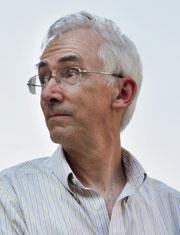 As part of my recent "group selection" explorations, I got around to reading David Sloan Wilson's text Truth and Reconciliation for Group Selection.
As part of my recent "group selection" explorations, I got around to reading David Sloan Wilson's text Truth and Reconciliation for Group Selection.I didn't wind up on anything llike the same page as Wilson, though I do feel as though I understand his position a bit more clearly.
This post will offer one specific criticism. David Sloan Wilson says:
If a trait is locally disadvantageous wherever it occurs, there is only one way for it to evolve in the total population - by being advantageous at a larger scale. Groups of individuals displaying social adaptations must survive and reproduce better than other groups, to counterbalance the disadvantage of the same adaptations within groups. All evolutionary theories of social behavior embody this logic.I don't think this is quite right. Sneezing is a locally disadvantageous trait to the humans that engage in it. It evolves not by offering group level benefits to humans, but by offering benefits to a symbiote - in this case a flu virus.
Wilson makes the same point repeatedly. Here he is again:
How can a behavior evolve in the total population when it is selectively disadvantageous within each and every group? Only if it is selectively advantageous at a larger scale.This isn't right. Coughing is disadvantageous in every group of humans - but it simply isn't selectively advantageous at a larger scale.
Cooperation among humans is partly caused by a broadly similar phenomenon. Rather than looking for benefits to high-level entities (groups) another hypothesis is that the organisms are being manipulated, to act against their own interests.
Many agents can perform manipulation - but in this case, cultural entities (based on memes) are important candidates to consider. Memes push humans into contact with one another for the simple reason that their reproduction depends on it. Memes often favour human contact - the more prolonged and frequent the better - because they need such contact in order to reproduce themselves.
This is the "symbiosis theory of altruism". Symbionts create a web of ecological interactions which pulls their associated communities together into tighter social groups. This is symbiology - not group selection.
With symbionts (disease agents or memes) in the picture, one can't just observe traits that are deleterious to the individuals that exhibit them - and then jump to the hypothesis that "group selection did it". That is not a legitimate move.
One could argue that these traits are beneficial sometimes - though not to the humans that exhibit them - they are beneficial to the memes whose extended phenotype they are part of. However, for some reason or another, it seems to be easy for people to accidentally leave memes out of their accounting scheme.
There are a few other ideas that can also help to explain the existence of apparently-deleterious traits:
- They are closely linked to advantageous traits;
- They are pleiotropic side effects of other traits;
- They evolved in a different environment;
- They are evolution's mistakes.










No comments:
Post a Comment